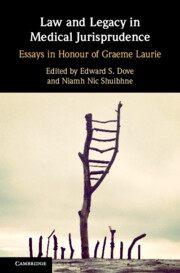Book contents
- Law and Legacy in Medical Jurisprudence
- Law and Legacy in Medical Jurisprudence
- Copyright page
- Contents
- Contributors
- Foreword
- Preface
- Table of Cases
- Table of Legislation
- Abbreviations
- Introduction
- 1 ‘Doing’ Medical Law and Ethics
- 2 A Philosopher Looks at ‘Law and Medical Ethics’
- 3 Thinking Outside the Box
- 4 The Public Interest in Health Research
- 5 Taking the Legacy Forward
- 6 On the Importance of Impact on Policy and Legacy
- 7 Breathing Life into Law
- 8 Biomedical Research Policy
- 9 The Burden of History
- 10 Body Parts and Baleful Stars?
- 11 The Legacy of the Warnock Report
- 12 ‘Only Time Will Tell’
- 13 Integrating the Biological and the Technological
- 14 UK Biobank and the Legal Regulation of Genetic Research
- 15 Overcoming Regulatory Impasse in Stem Cell Research and Advanced Therapy Medicines in Argentina through Shared Norms and Values
- 16 Institutions, Interpretive Communities and Legacy in Decision-Making
- 17 Towards a New Privacy
- 18 A Tale of Two Legacies
- Afterword
- Index
13 - Integrating the Biological and the Technological
Time to Move Beyond Law’s Binaries?*
Published online by Cambridge University Press: 23 December 2021
- Law and Legacy in Medical Jurisprudence
- Law and Legacy in Medical Jurisprudence
- Copyright page
- Contents
- Contributors
- Foreword
- Preface
- Table of Cases
- Table of Legislation
- Abbreviations
- Introduction
- 1 ‘Doing’ Medical Law and Ethics
- 2 A Philosopher Looks at ‘Law and Medical Ethics’
- 3 Thinking Outside the Box
- 4 The Public Interest in Health Research
- 5 Taking the Legacy Forward
- 6 On the Importance of Impact on Policy and Legacy
- 7 Breathing Life into Law
- 8 Biomedical Research Policy
- 9 The Burden of History
- 10 Body Parts and Baleful Stars?
- 11 The Legacy of the Warnock Report
- 12 ‘Only Time Will Tell’
- 13 Integrating the Biological and the Technological
- 14 UK Biobank and the Legal Regulation of Genetic Research
- 15 Overcoming Regulatory Impasse in Stem Cell Research and Advanced Therapy Medicines in Argentina through Shared Norms and Values
- 16 Institutions, Interpretive Communities and Legacy in Decision-Making
- 17 Towards a New Privacy
- 18 A Tale of Two Legacies
- Afterword
- Index
Summary
The common law takes a bounded approach to persons and objects: something is either a person (subject) or a thing (object), but not both. This conceptualisation of persons as bounded selves and objects as separate from persons represents an encumbrance that goes to the very heart of law. The person–thing binary is so fundamental that it both structures the law conceptually and dictates its practical applications. This chapter explores the consequences of this legacy in relation to ‘everyday cyborgs’ – that is, persons with attached and implanted medical devices. Drawing on Graeme Laurie’s work, it argues that recognising the inherent liminality of everyday cyborgs (and everyday cyborg technologies) allows us to look beyond law’s binaries more fully to account for the ‘spaces in-between’. The chapter finds that Laurie’s liminal analysis of law and his framework for processual regulation give us much needed analytical tools to begin to look beyond boundaries, beyond binaries and beyond bodies.
Keywords
- Type
- Chapter
- Information
- Law and Legacy in Medical JurisprudenceEssays in Honour of Graeme Laurie, pp. 279 - 306Publisher: Cambridge University PressPrint publication year: 2022

